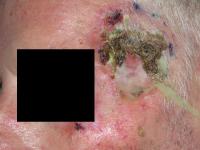This lesion is best treated by excision and reconstruction.
I would ensure that the history has been taken and that a full clinical
examination has been performed.
I would double check the histological results to ensure that they belong
to the patient then I would meet with the patient (and his family if he
wished) to discuss the diagnosis and make plans for further treatment. This
meeting should ideally happen in private and with a senior member of the
surgical team.
The best option in this situation would be surgical excision and
reconstruction. Radiotherapy can be considered for squamous cancers, but the
location of this lesion close to the eye would make protection of the eye from
the harmful effects of radiation difficult. Topical therapy in the form of
fluro-uracil would probably not confirm much benefit in an advanced lesion
such as this and systemic chemotherpay offers little benefit.
I would recommend to the patient that he consider surgical excision with
reconstruction.
I think that on the first discussion it would not be
appropriate to go into details regarding the procedure, the risks involved
etc, however, if the patient wanted to discuss this I would have a full
discussion with him.
Radiotherapy can be used for skin squamous cancers, often with good results,
however this lesion on the temple is close to the eye and radiotherapy may
cause cataract and blindness when used to treat a neoplasm in this location.
MRI scanning has no role to play at this juncture. If you want to treat the
patient differently if you find MRI evidence of metastatic disease then MRI
may be reasonable but most would treat the patients primary cancer and follow
them up clinically to see what happens.
Chemotherapy in the form of 5 fluro-uracil cream is used to treat carcinoma
in situ of the skin but is not very useful in large lesions. Similarly
systemic chemotherapy is not routinely used due to a poor response.
